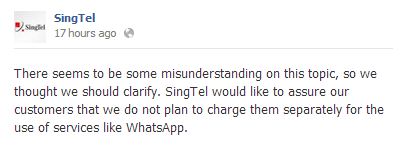
SingTel has clarified that it has no plans to charge consumers separately for using the WhatsApp service, as well as for other so-called over-the-top services that make use of the Internet connection it offers.
In several posts on Facebook yesterday evening, the telecom operator explained that a separate WhatsApp plan, announced last year, was aimed at those who want to have unlimited WhatsApp messages at a fixed cost.
Users who already subscribe to a mobile Internet service do not have to separately pay to use the online messaging service, which is one of the most popular in Singapore.
Unhappy customers had taken to SingTel’s Facebook page yesterday to vent their anger after mistakenly believing that the telco wanted to charge more for using WhatsApp on their mobile phones.
This came after after chief executive officer Chua Sock Koong said in an industry event this week that it wants the likes of WhatsApp and Skype to pay it to use its networks. Without this, she added, telcos would not be able to continue investing in their networks, as consumers use up ever more resources through such popular online services.
The remarks, made at the Mobile World Congress show in Barcelona, struck a raw nerve for many users.
Some believed that this cost would eventually be passed down to them, while others mistakenly pointed to an earlier WhatsApp plan from SingTel as evidence that the telco has already started charging users more.
Singapore’s government regulator, meanwhile, has adopted a wait-and-see approach, according to the Today newspaper. The Infocomm Development Authority did say, however, that it is studying both SingTel’s and StarHub’s plans to “protect consumers’ interests, while allowing marketing innovation”.
“Internet Services Providers are not allowed to block legitimate Internet content; neither should they impose restrictions, charges or other measures that will render any legitimate Internet content effectively inaccessible or unusable,” it said.
“ISPs are also not allowed to adopt Internet traffic management practices that will compromise IDA’s Quality of Service standards for Internet access or any anti-competitive discriminatory practice that would harm consumers’ interest,” it added.






So it will charge Whatsapp and the likes, which will charge who eventually?